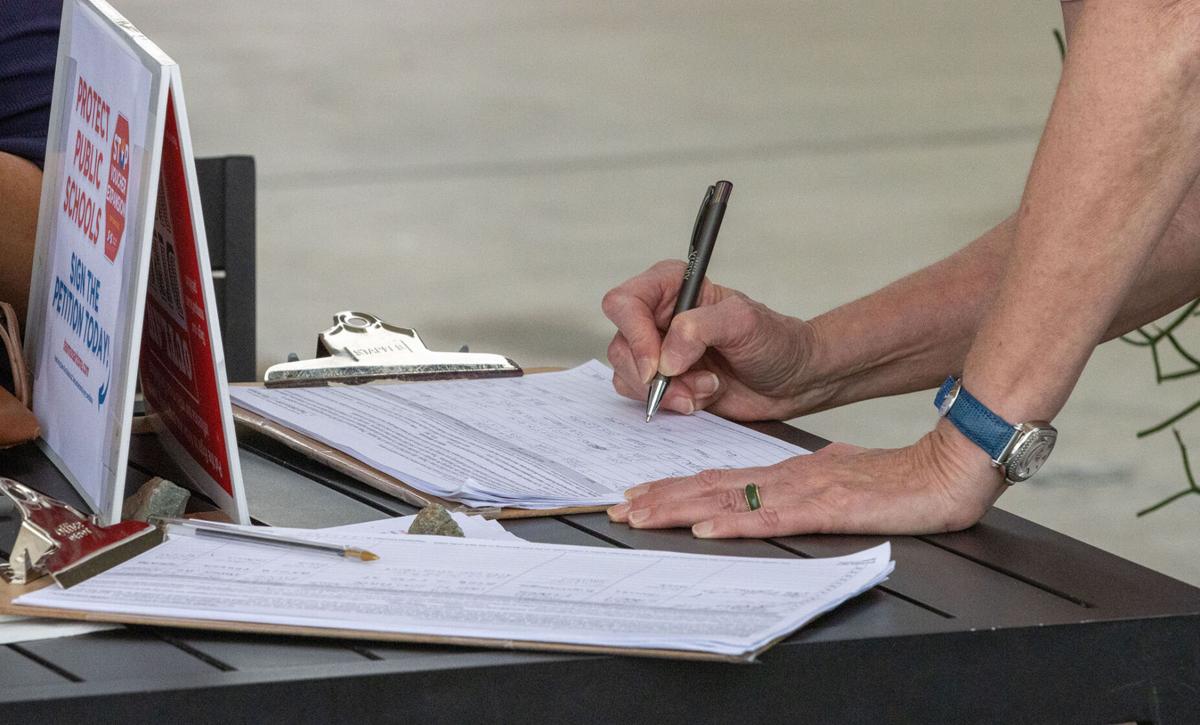The same thing that opponents hated about the state’s expanded Empowerment Scholarship Account program may have saved it.
By making the program available to all 1.1 million school children, the Legislature and Gov. Doug Ducey multiplied the number of people with a stake in the existing program.
So, when opponents of the voucher expansion effort decried its potential effect on public school funding and launched a petition drive to repeal it, they faced a galvanized opposition.
The Arizona Secretary of State hasn’t made it official yet, but it appears that the petition drive by Save Our Schools has fallen short of the number of signatures needed to refer the issue to the ballot.
Christine Accurso, a leading opponent from Gilbert, credits in part the effort she spearheaded to protest where volunteers were collecting signatures to refer the program to the ballot. That caused a significant number of potential signers to at least think twice, if not decline altogether, she said.
“What changed this year is this is the law we all always wanted,” she said. “It’s not just for select students in Arizona, but for all students in Arizona.”
So there were potential beneficiaries, such as home-schooling families, who had a direct stake in this ESA debate and came out to protest signature-gathering by Save Our Schools members.
Fatigue was also a likely factor. Many of the same people worked on petition drives related to K-12 education in 2017, 2018, 2020 and 2021.
“Their team has gotten exhausted,” Accurso said. “I am too, though.”
Wes Oswald, a Tucson teacher and leading signature-gatherer through the years, acknowledged the fatigue factor.
“People are just exhausted by this. They’re tired of it. They’re sick of their voices not being heard,” he said.
An additional factor, Oswald noted: “This was almost exclusively volunteer-led. The others relied heavily on volunteer petitioners.”
Then there’s the little-noticed time factor: Ducey signed the bill 10 days after it was passed, as late as he could. That reduced the number of days for petitioners to gather signatures from 90 to 80.
Beth Lewis, who heads Save Our Schools, estimated originally that the group had collected about 141,000 signatures, but that was a rough and optimistic estimate. Opponents who have reviewed the petitions say the real number is less than 100,000, or far fewer than the 118,823 needed.
The Secretary of State’s Office has 20 days from Sept. 23 to complete its review.
Debateless in CD6
It turns out that getting the candidates in Congressional District 6, Republican Juan Ciscomani and Democrat Kirsten Engel, to debate will be an impossible task.
On Aug. 29, Engel showed up for a debate on Arizona PBS in Phoenix. Ciscomani did not. Engel got the stage all to herself.
Something similar happened in reverse on Sept. 22. Ciscomani, the Republican candidate, faced an empty chair when he showed up to a forum that day. Donovan Kramer, the editor of the Casa Grande Dispatch, was expecting Engel, but she was a no-show.
“We were definitely expecting it,” Kramer said. “We had a seat set up, and we were left with one candidate.”
As a result, it was a relatively short event, broadcast on Facebook Live, with Ciscomani answering a series of questions and then giving a closing statement, Kramer said.
There apparently was a communications breakdown with Engel’s campaign. Kramer said Engel’s team accepted on Aug. 18, but Engel spokeswoman Sophia Brown said the candidate had never confirmed her attendance and did not receive any information about the forum after early August.
In addition, Arizona Public Media in Tucson tried to arrange a debate, but that became impossible due to “logistics” issues, host Christopher Conover said. Instead, both candidates will come in for separate interviews, which is scheduled to be aired at 8 p.m. on Oct 14 on Channel 6, KUAT.
Abortion issue escape
While Ciscomani tweaked Engel about the Casa Grande debate fiasco this week, Engel tweaked Ciscomani over an incident in which a person approached him at a campaign event in a park to ask about abortion bans.
“To be honest, I’m an independent, I’m on the fence, I’m like learning, you know,” the voter said, as somebody videotaped. “My question is, what’s your feeling about it?”
As the voter asked, two members of Ciscomani’s campaign staff approached him, said his wife was calling him and needed help with their kids. Ciscomani pulled out his phone and said “she texted me right now, give me one second,” then walked away.
Nearby under the same ramada, legislative candidate Stan Caine shrugged his shoulders and said “Is he just going to walk away?”
The progressive group Indivisible identified the voter as “Sonia E” and spread the video, mocking Ciscomani as running away from the issue.





